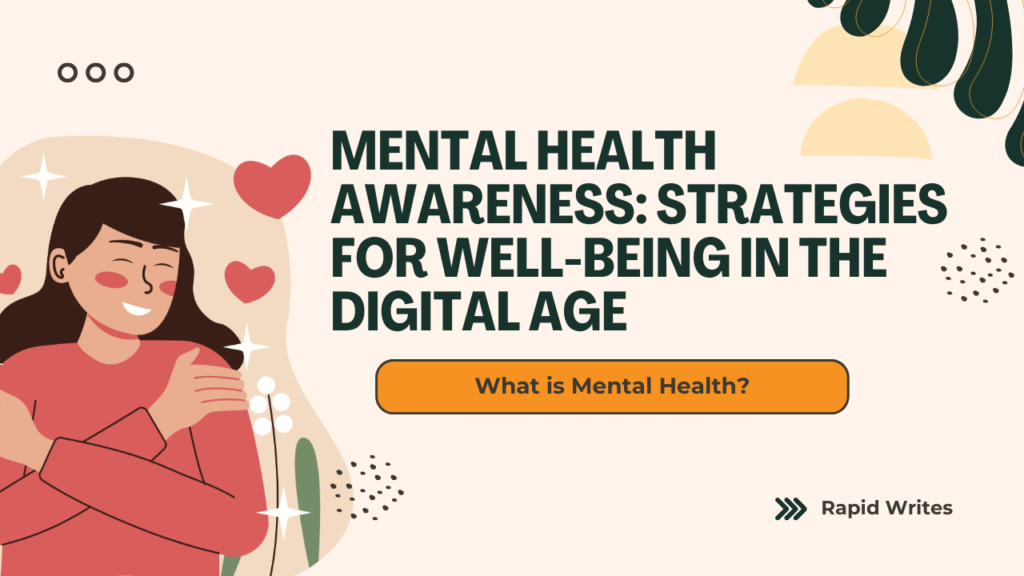Introduction
In an era where our lives are increasingly intertwined with digital technologies, understanding the impact of these tools on our mental health has never been more critical. The convenience and connectivity offered by smartphones, social media, and the internet at large have transformed the way we work, socialize, and relax. However, this constant digital engagement also presents new challenges for our mental well-being. This blog post aims to shed light on the importance of mental health awareness in the digital age and provide readers with practical strategies to navigate the complexities of digital life without compromising their mental health.
The Digital Age and Mental Health
Overview of the Digital Landscape
The digital age has revolutionized access to information, communication, and entertainment. With just a few clicks, we can connect with friends across the globe, access vast amounts of information, and stream endless content. This digital revolution has reshaped our daily lives, making technology an indispensable tool.
Impact on Mental Health
While digital technologies offer numerous benefits, their impact on mental health is a double-edged sword. On one hand, they provide platforms for social connection, online learning, and mental health resources. On the other hand, excessive or unregulated use of these technologies can lead to increased feelings of anxiety, depression, and isolation. Social media, in particular, has been criticized for contributing to unrealistic comparisons, cyberbullying, and the erosion of face-to-face social skills.
Statistics and Studies
Recent studies highlight the complex relationship between digital technology use and mental health. For instance, research suggests that high levels of screen time are associated with decreased psychological well-being among adolescents. Another study points out the benefits of digital detoxes and mindful use of technology, indicating improved sleep quality and higher life satisfaction levels when digital consumption is moderated.
Recognizing Signs of Digital Fatigue
Definition and Symptoms
Digital fatigue refers to the state of mental exhaustion and disinterest that arises from excessive use of digital devices and platforms. Symptoms can include feeling overwhelmed by online interactions, irritability, difficulty concentrating, and a general disinterest in screen-based activities.
Causes of Digital Fatigue
The root causes of digital fatigue often lie in the relentless barrage of notifications, the pressure to be constantly available online, and the information overload that comes with navigating the digital world. This constant state of hyper-connectivity can strain our cognitive resources, leading to mental fatigue and reduced productivity.
Strategies for Well-being in the Digital Age
Navigating the digital world without compromising your mental health requires conscious effort and deliberate strategies. Here are several effective approaches:
Digital Detox
Importance of Taking Breaks
Regularly disconnecting from digital devices can significantly improve mental health. A digital detox, or a period of time during which a person refrains from using tech devices, can help reduce stress, improve sleep, and increase mindfulness and presence in the real world.
How to Effectively Do a Digital Detox
- Set Clear Goals: Determine why you’re doing a detox and what you hope to achieve.
- Start Gradually: Begin with short periods of time away from digital devices and slowly extend the duration.
- Notify Your Contacts: Let friends, family, and work colleagues know about your detox period to manage expectations.
- Find Alternative Activities: Engage in non-digital hobbies or activities that you enjoy.
- Reflect on the Experience: After the detox, reflect on how it made you feel and consider implementing regular digital breaks into your routine.
Mindful Use of Technology
Using technology mindfully means being aware of how it impacts your life and mental health. Here are tips for cultivating a healthier relationship with digital devices:
- Be Intentional: Use technology for specific purposes rather than mindless scrolling.
- Limit Notifications: Turn off non-essential notifications to reduce distractions and stress.
- Quality Over Quantity: Focus on meaningful digital interactions rather than the number of connections or followers.
Creating a Balanced Digital Life
Balancing online and offline activities is crucial for mental well-being. Here’s how you can achieve a more balanced digital life:
- Schedule Offline Time: Designate times of the day or week as tech-free zones.
- Prioritize Face-to-Face Interactions: Make an effort to spend more time with friends and family in person.
- Diversify Leisure Activities: Explore hobbies and interests that don’t involve screens.
Online Support and Resources
The internet offers valuable resources for mental health support, including:
- Teletherapy Services: Professional counseling and therapy services available online.
- Mental Health Apps: Apps designed to help manage anxiety, depression, and other mental health conditions.
- Educational Content: Articles, videos, and courses on mental health and well-being.
Physical Activity and Nature
Regular physical activity and spending time in nature have been shown to improve mental health significantly:
- Exercise Regularly: Physical activity can reduce symptoms of depression and anxiety.
- Connect with Nature: Time spent in natural environments can lower stress levels and improve mood.
Sleep Hygiene
Good sleep hygiene is essential for mental health, especially in the digital age:
- Limit Blue Light Exposure: Avoid screens at least an hour before bedtime to improve sleep quality.
- Establish a Sleep Routine: Try to go to bed and wake up at the same time every day.
Case Studies and Success Stories
Many have found success in implementing these strategies to combat the adverse effects of digital consumption on mental health. For instance, John, a software developer, found that regular digital detoxes over the weekend helped him reduce anxiety and improve his concentration at work. Meanwhile, Emily, a high school teacher, discovered that mindful use of technology allowed her to enjoy social media without feeling overwhelmed by it.
By taking proactive steps to manage digital consumption, individuals can significantly enhance their mental well-being in the digital age.
Conclusion
In our digitally dominated world, maintaining mental health requires awareness and active management of our digital consumption. By recognizing the signs of digital fatigue and adopting strategies for a balanced digital life, we can protect our mental well-being. Remember, it’s okay to seek professional help if you’re struggling to manage on your own. Let’s embrace the digital age with mindfulness and intention, prioritizing our mental health every step of the way.



